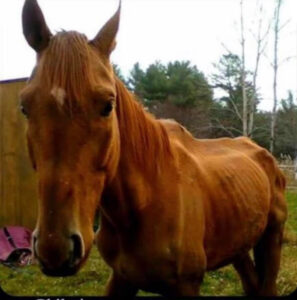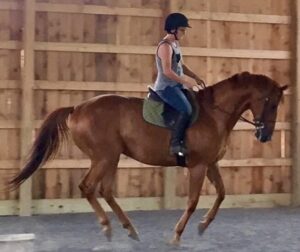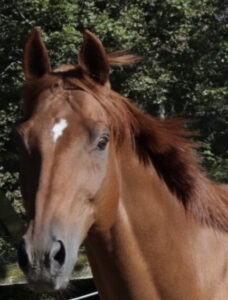Article:
Does It Matter?

Being born a foal on a prosperous breeding farm is not a bad start to life. Surrounded by lush green fields dotted with clover, trees covered with verdant leaves gently moving in the breeze, and watched by your mom as you romp around a huge paddock — you are in a Thoroughbred kingdom. Life is good. For now.
Soon, too soon, you will be torn away from that idyllic existence.
Before your second year, sometimes well before it, you will be hauled away to a race track where your life will change radically. You will be confined to a stall for approximately 22 hours a day, except to train on the track or participate in a race. A jockey will be hoisted onto your back and force you to run at furious speeds, causing great stress to your still-developing bone structure. As you thunder around the track, you will be repeatedly whipped though you are running as fast as you can. And that whip will sting, as your flesh is sensitive enough to feel the bite of a horse fly on your rump. But no one cares. You are there to make money for your owner and for all those who bet on the race.
After the race, regardless of whether you have won or lost, all sweaty and exhausted, and possibly in pain, you will be led back to solitary confinement in your stall. This is your lot in life – you are a Thoroughbred.
When your racing days are over, and they are over as soon as you stop coming in at or near the top, the next stage of your life begins, assuming you have not died on the track, as so many do each year.

The livestock auction regards you as a commodity and the quicker they hustle you through the better. If you are unlucky and fall into the hands of what are known as kill-buyers, you will find yourself crammed into a hauler truck along with many other unfortunates, traveling for numerous hours without food, water, or rest heading to a Canadian or Mexican slaughter house.
Alternatively, rather than sending you to auction, that new owner may simply leave you neglected in a field, failing to provide you with proper food and vet care to the point that concerned citizens call the police — you are removed and the owner is charged with cruelty.

In either case, if you are lucky, you will be one of the few taken in by a reputable equine rescue. Arriving there, as you come down the trailer ramp, you again will see grassy pastures and sunny skies. And for some, that adjustment is trouble-free; for others, it will take time to overcome the psychological scars in addition to the physical trauma endured over the years — you may be afraid when a caring person leads you into a large paddock. You may rear up or run in endless circles and just not know how to “settle.” It will take time, but hopefully caring hearts and hands will help you overcome the ordeal you have suffered. You are lucky. You made it here.
Sadly, an Albany Times Union investigation informs us that we, the citizens of NYS, are supporting this cruelty. How? We, as citizens, own the property and facilities where the three Thoroughbred tracks operated by the New York Racing Association (NYRA) are located. We pay the property taxes. And though NYRA has a lease agreement with the state, NYRA pays no rent. In addition, the state provides NYRA with a portion of the income from various video lottery terminals owned by the state — income that could instead be used to fund education and veterans’ programs; income that could help reduce the amount of taxes we pay. Lastly, to encourage Thoroughbred owners to participate in the NYS racing industry, millions of dollars in racehorse sales, as well as transactions related to horse maintenance and equipment, are free of state sales taxes. Is this fair? Does it matter?
It matters to the exploited and damaged horses who are but pawns in this financial fiasco. And because of them, it should matter to us.
New York State Humane Association Humane Review, Vol.XLI, Spring 2023.